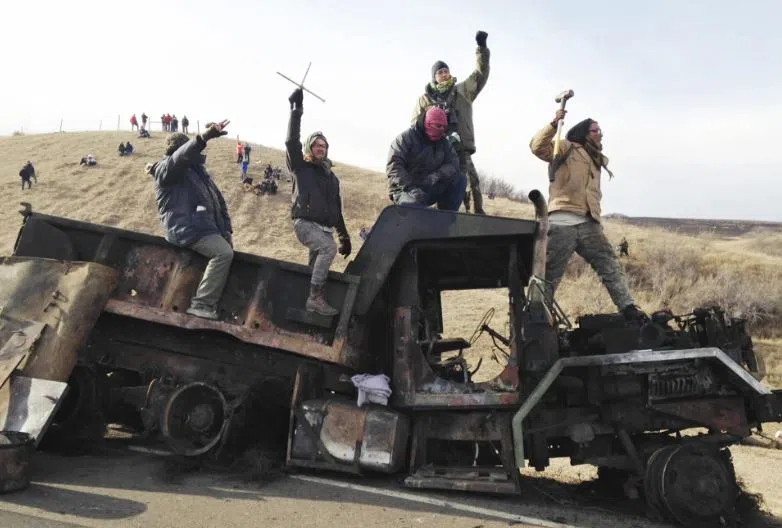
By: Mary Steurer
BISMARCK, N.D. (North Dakota Monitor) – Attorneys representing environmental activist group Greenpeace have asked a North Dakota judge to penalize Dakota Access Pipeline developer Energy Transfer for allegedly refusing to turn over documents related to the company’s track record for safety.
An attorney for Energy Transfer said in a Tuesday hearing the company has made a sincere effort to comply with all of Greenpeace’s records requests, and that the penalty would be a fatal blow to its lawsuit.
Energy Transfer filed suit against Greenpeace in 2019 over the group’s involvement in the 2016 and 2017 protests against the Dakota Access Pipeline, often referred to as DAPL, accusing Greenpeace of criminal conduct and of intentionally circulating false claims about the pipeline company to harm its reputation. Energy Transfer claims Greenpeace cost them tens of millions of dollars in damages, including by tarnishing its relationship with the banking community.
Thousands of demonstrators descended on south-central North Dakota in 2016 and 2017 in solidarity with the Standing Rock Sioux Tribe, which opposes DAPL out of the belief the pipeline is a violation of its sovereignty and could contaminate its water supply. Greenpeace was one of many activist groups that supported the protests.
To defend itself against the claims that it harmed Energy Transfer’s reputation, Greenpeace asked Energy Transfer for documents related to spills and leaks by the company’s pipelines. That included records related to any federal, state or local enforcement actions.
Adam Caldwell, an attorney representing Greenpeace, said Tuesday that Greenpeace has a right to know about such safety incidents because “those are the things that we will show as an alternate basis for their alleged reputational harm and their alleged banking damages.”
Caldwell said Greenpeace has obtained six court orders, including one from the North Dakota Supreme Court, compelling Energy Transfer to hand over the records, but that the company is still fighting Greenpeace on several fronts. For example, Energy Transfer refuses to turn over records related to an enforcement action taken by the EPA against the company, he said.
Greenpeace now wants Southwest Judicial District Court Judge James Gion to strike, or at the very least limit, Energy Transfer’s defamation-related claims so the environmental group no longer needs the records.
“There is no need for us to wait longer when they’ve already told us they’re not going to comply,” Caldwell told Gion during Tuesday’s hearing.
Energy Transfer attorney Trey Cox called Greenpeace’s request extreme and unprecedented.
“What they’re interested in is some sort of case-stopping evidentiary or death penalty sanction,” Cox said at the hearing.
Gion said he would take the motion under advisement.
Cox said that the company has supplied Greenpeace with more than 133,000 pipeline safety documents, including over 7,000 internal communication documents.
“This is good faith, this is working together,” Cox said. “This is not intentional or willful violation of a court order.”
Caldwell on Tuesday acknowledged that Energy Transfer had turned over a high volume of records, but that much of it was not related to what Greenpeace asked for. He likened it to asking for a hammer and getting a wrench, screwdriver, saw and paintbrush in return.
Greenpeace has said in court filings that most of the documents Energy Transfer gave them were provided in May, just weeks before the case was originally set to go to trial. As a result, Greenpeace asked for the trial to be postponed. It’s now scheduled for February.
Greenpeace suggested in court records Energy Transfer purposefully did this to draw out the legal battle.
Greenpeace has also asked Gion to order Energy Transfer to compensate the environmental group for the time and money it spent on this evidence dispute.
Energy Transfer has already voluntarily dropped some of the defamation claims it initially brought against Greenpeace when it filed suit in 2019, including that Greenpeace specifically harmed its reputation by circulating claims that the pipeline was at risk to spill and would harm the environment.
Energy Transfer wrote in court documents it was forced to abandon those arguments because Greenpeace had used “scorched earth discovery” tactics and asked for a burdensome amount of records from the company. As a result, Energy Transfer claims it had to narrow the scope of its case “to focus on Greenpeace’s most egregious actions.”
Both parties have designated a significant portion of case materials as confidential under a protective order approved in 2021.
The Water Protector Legal Collective, a legal group created to represent DAPL protesters facing criminal charges, in July filed a motion to join the case to access confidential documents related to pipeline leaks and spills, arguing the public has an interest in knowing about any safety incidents connected to DAPL.
Energy Transfer opposes Water Protector Legal Collective’s request, while Greenpeace does not. Gion has not yet ruled on the motion.
Greenpeace isn’t the only defendant in the case; Energy Transfer is also suing two demonstrators and a protest group called the Red Warrior Society.
Greenpeace general counsel Deepa Padmanabha said that Energy Transfer is intentionally bringing the lawsuit to punish advocacy organizations and protesters.
“This lawsuit is much bigger than just Greenpeace – it is an attack on advocacy, during a time when protecting our right to dissent is more important than ever,” Padmanabha said in an email.
Cox did not respond to a request for comment in time for publication.
The Dakota Access Pipeline, completed in 2017, carries crude oil from northwest North Dakota to Illinois.




Comments